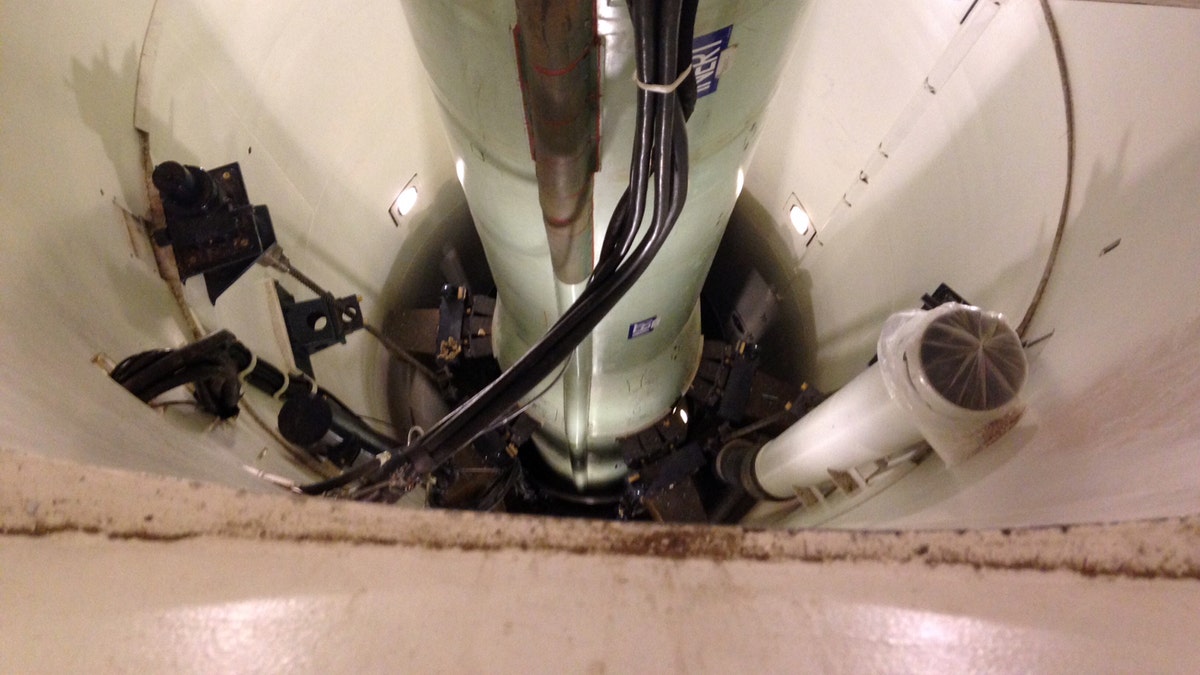
This photo taken Jan. 9, 2014 shows a mockup of a Minuteman 3 nuclear missile used for training by missile maintenance crews at F. E. Warren Air Force Base, Wyo. In taking a deep look at trouble inside U.S. nuclear forces, Defense Secretary Chuck Hagel is searching for the root causes of recent Air Force missteps but also for ways to make the nuclear warrior’s job more attractive when the military has turned its attention away from such weapons. (AP Photo/Robert Burns) (The Associated Press)
WASHINGTON – The Pentagon's decision to look into what ails the Air Force group responsible for nuclear missiles was hardly a bolt from the blue.
It followed months of accumulating evidence of trouble in a segment of the military few Americans even think about. Why would they? The Cold War ended a generation ago, and with it, seemingly, the threat of nuclear war. For more than a decade the U.S. has been focused on wars of a very different kind in Iraq and Afghanistan.
Some questions and answers about the nuke problem and how the Pentagon is going about fixing it.
___
Q. What's the basic issue here?
A. No one has defined it in full, but Defense Secretary Chuck Hagel last week summed it up as "personnel failures."
He was alluding to a series of missteps by the nuclear Air Force over the past year — most recently allegations of drug use and cheating on written tests designed to ensure that nuclear missile officers know their job. Before that it was the commander of the missile force getting fired for misbehavior in Russia, including drunkenness, and before that it was missile officers getting pulled off duty for attitude problems. The Associated Press in November revealed serious security lapses and that a study commissioned by the Air Force found evidence of "burnout" among a sampling of missile launch control officers — the men and women with the keys in their hands.
___
Q. Why is this happening now?
A. That is part of what Hagel wants to find out through a small group of outside experts that he is assembling. They are supposed to give him answers within 90 days. What's already clear is this: The problems are not new. What's new is the public's awareness of them and top-level Pentagon officials acting on them.
___
Q. What is this missile force?
A. It is a relatively small, unheralded segment of the Air Force whose job is to operate 450 nuclear-tipped missiles that stand in underground silos, hidden and ready on a moment's notice to soar to a target almost anywhere on the globe. They are called Minuteman 3 missiles and they have been "on duty" since 1970.
Earlier generations of missiles performed the same function starting in 1959 as a key weapon in the Cold War with the former Soviet Union. To this day, none has ever been launched other than for test purposes.
___
Q. Why does the U.S. still have these missiles?
A. The Obama administration views these intercontinental ballistic missiles, or ICBMs, as an important part of U.S. nuclear defenses, along with nuclear missiles aboard Navy submarines and nuclear-armed Air Force bombers. The basic idea is that they help deter a nuclear attack on the U.S. On the other hand, critics argue that these weapons would not dissuade a terrorist group from using a nuclear device, should it obtain one. Al-Qaida, for example, has no state of its own to defend or reason to be deterred by ICBMs.
Whatever its future, the ICBM force is expected to shrink, perhaps to 400 missiles in the next several years.
___
Q. Where are the U.S. missiles and are they safe?
A. They are divided into three groups of 150 missiles each. One group is in Montana, another in North Dakota and a third is based near Cheyenne, Wyo., with its 150 missiles spread around parts of Wyoming, Colorado and Nebraska. They are monitored 24 hours a day by pairs of young officers on so-called alert in underground command posts in the missile fields. Security forces guard the missile fields, and the Air Force is in the midst of making a number of security improvements that were ordered up after the 9/11 terrorist attacks.
The weapons are of such enormous power — physically, psychologically and politically — that the only person authorized to order their use is the president.
Hagel says he has no doubt that the weapons are secure. However, he is clearly concerned that public confidence is at risk. He said last week that recent missteps within the ICBM force "threaten to jeopardize the trust the American people have placed in us to keep our nuclear weapons safe and secure."
___
Q. What's the solution?
A. There is no telling what recommended action will come from Hagel's review team; he has not even named its members. But there is no shortage of ideas. In recent months some people outside the Air Force have said the strain on the officer corps that is responsible for ICBM operations could be reduced by giving the ICBM launch control duties to Air National Guard members. Others have suggested keeping it within the active Air Force but assigning senior enlisted men and women instead of officers. Still others have asked, why not take at least some missiles off high alert so that they would not need to be monitored constantly.
Still others recommend making the ICBM jobs more attractive by offering the crews a host of extra incentives, financial and educational.
___
Follow Robert Burns on Twitter at http://www.twitter.com/roberetburnsAP

